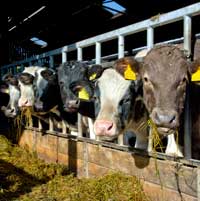Meat eating ‘greener than veggie diet’

Eating red meat could be more environmentally-friendly than becoming a vegetarian, according to research on the impact of meat substitutes.
The study by Cranfield University, commissioned by the World Wildlife Fund, said many meat substitutes were produced from imported lentils, soy and chickpeas.
Switching to those types of food meant more land would be cultivated overseas, increasing the risk of forests being destroyed.
Many meat substitutes also needed energy-intensive systems to produce and process them, the study added.
The findings are in contrast to environmental group claims that eating meat harms the environment and that people should switch to a meat-free diet to help cut greenhouse gas emissions.
But the study says: “A switch from beef and milk to highly refined livestock product analogues such as tofu could actually increase the quantity of arable land needed to supply the UK.”
The UK’s livestock industry could also collapse if vegetarianism increased significantly, it adds.
This would shift meat production overseas to countries with few regulations to protect forests and uncultivated land.
Donal Murphy-Bokern, one of the study’s authors said: “For some people, tofu and other meat substitutes symbolise environmental friendliness but they are not necessarily the badge of merit people claim.
“Simply eating more bread, pasta and potatoes instead of meat is more environmentally friendly.”
But the Vegetarian Society’s Liz O’Neill said the figures used in the report were based on “questionable assumptions” about how vegetarians balanced their diet and how the food industry would respond to changes in demand.
“If you’re aiming to reduce your environmental impact by going vegetarian then it’s obviously not a good idea to rely on highly processed products,” she told The Times.
“But that doesn’t undermine the fact that the livestock industry causes enormous damage and that moving towards a plant-based diet is good for animals, human health and the environment.”
